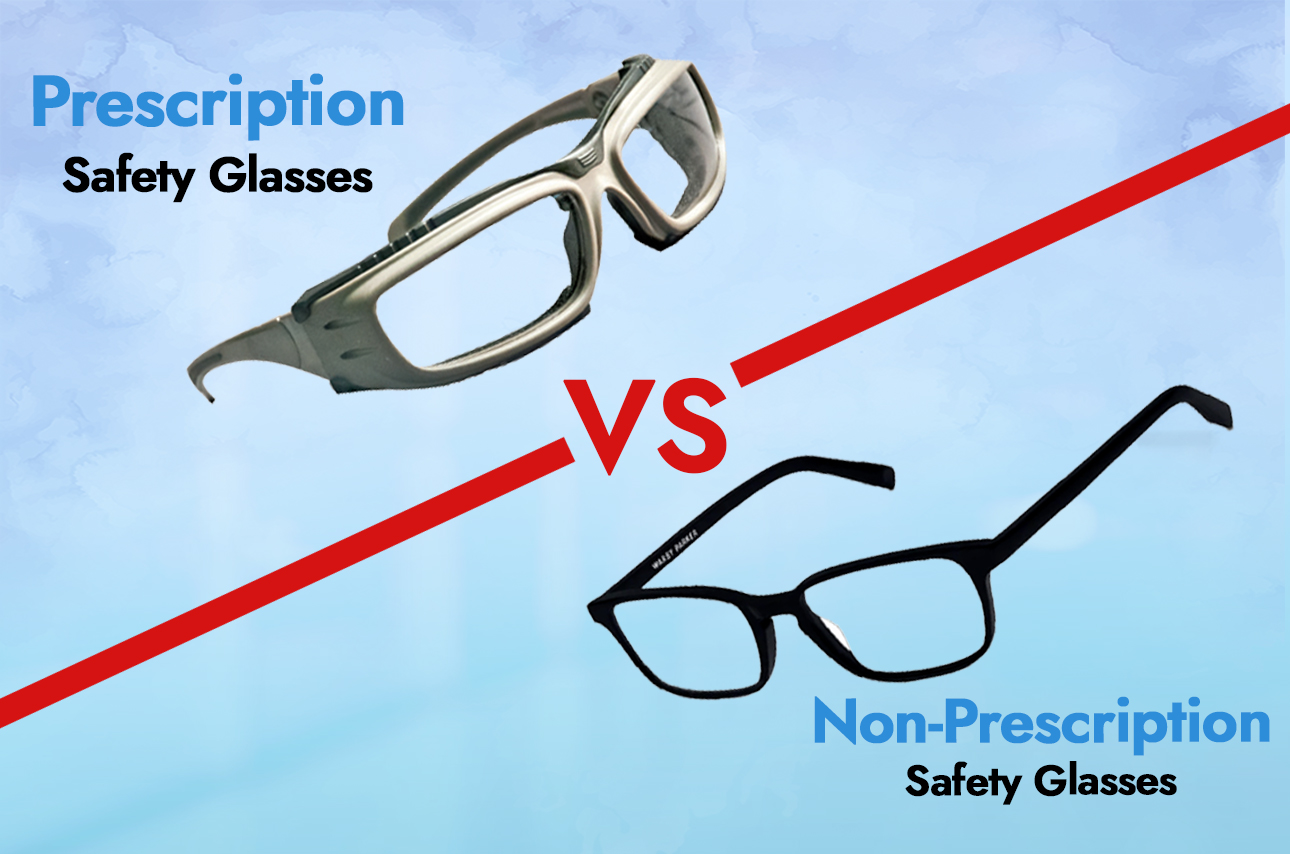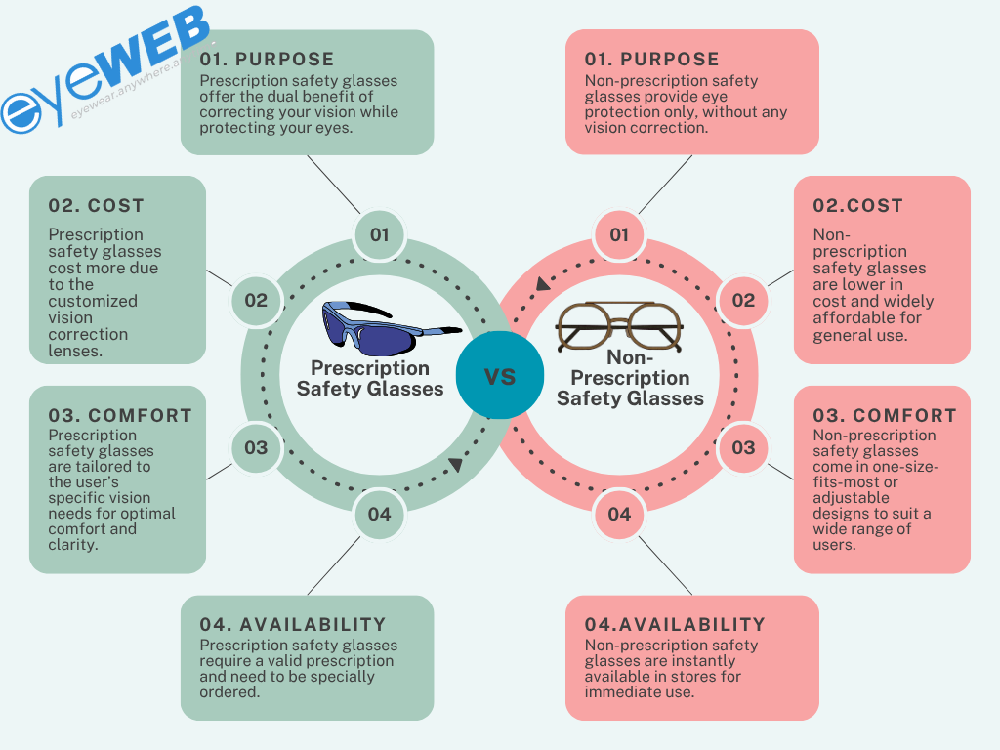
Blog
Prescription vs. Non-Prescription Safety Glasses: Which Do You Need?
People in construction, laboratories, and industry must use eye protection. You can avoid serious eye issues by making sure you’re always wearing safety glasses. Even so, some safety glasses are better than others.
There are two kinds: prescription and non-prescription safety glasses. Your choice of glasses relies on your eye health and where you spend most of your time at work. If you already use glasses, go for prescription safety glasses. If your eyesight is fine, then non-prescription options will do.
Selecting a comfortable and safe pair of eyeglasses is the key to being productive. Getting the wrong type of eyewear may not only make you uncomfortable but could also put you at risk.
Let’s talk about the big differences between these varieties.
Significance of Safety Glasses
Safety glasses protect your eyes from danger. These dangers include flying particles, dust, chemicals, and even radiation. They are more durable than ordinary eyeglasses and adhere to special safety requirements.
The most critical requirement is ANSI Z87.1. These glasses are impact-resistant as per this standard. This means that they can withstand rugged conditions in the workplace or at home.
There are numerous varieties of safety glasses available. Some encircle the eyes for improved protection on the sides. Others have foam padding or anti-fog lenses. They may be used in factories, labs, hospitals, and workshops.
The primary task is straightforward: avoid eye injury. The right safety glasses can help you shield your vision. Whether you need vision improvement or not, you will find a pair of glasses that suits you.
Making an informed choice requires knowledge of both prescription and over-the-counter safety eyewear.

What Are Prescription Safety Glasses?
Prescription safety glasses are designed for individuals with vision problems who require assistance with clear vision. They couple your prescription and protectiveness. It means you don't have to wear your everyday glasses under safety glasses. Safety glasses are designed for your precise vision requirements. Single vision, bifocal, or progressive lenses are available. Many have coatings such as anti-scratch or anti-fog.
Although they are safety-tested, prescription safety glasses have the same look as regular glasses. They are usually found in construction, laboratories, and among healthcare workers.
Advantages:
- Complete eye protection and unhindered vision combined
- Precision-made for comfort and clarity
- Available in fashionable, long-lasting designs
- May contain special coatings for various environments
Disadvantages:
- More expensive than regular safety glasses
- Need a valid prescription
- It can take time to make and send
For the everyday wearer, this choice is usually the most convenient and safest.
What Are Non-Prescription Safety Glasses?
Non-prescription safety glasses lack vision correction lenses. They are designed for individuals with sharp vision or for those who use contact lenses. Such glasses are also referred to as "plano" glasses.
They offer the same level of eye protection as prescription glasses. Many have features including wraparound designs, anti-fog coatings, and UV protection.
They are best for temporary or occasional wear. Most offices supply them to visitors or employees who won't require prescription lenses.
Advantages:
- Inexpensive and simple to replace
- No prescription required
- Prevalent in a vast array of designs
- Ideal for visitors or temporary staff
Disadvantages:
- Not effective for those with eyesight problems
- It may be uncomfortable if placed over regular glasses
- Limited lens option
These glasses are suitable for anyone who does not need corrective lenses. They are ideal for general use that involves potential eye hazards.
Key Differences Between Prescription and Non-Prescription Safety Glasses
The primary distinctions between prescription and non-prescription safety glasses are contrasted in the following:
Feature | Prescription Safety Glasses | Non-Prescription Safety Glasses |
Purpose | Correct vision + protect eyes | Eye protection only |
Lens Materials | Custom-made with vision Rx | Standard impact-resistant lenses |
Safety Standards | ANSI Z87.1 certified | ANSI Z87.1 certified |
Cost | Higher due to prescription | Lower and widely affordable |
Comfort & Fit | Tailored to the user | One-size-fits-most or adjustable |
Availability | Requires a prescription and order | Instantly available in stores |
How to Choose the Right Type?
Begin with your vision requirements. If you require glasses daily, opt for prescription safety glasses. They provide you with a clear vision as well as protection simultaneously. You will not need to deal with two pairs.
If you have perfect vision or if you use contacts, non-prescription safety glasses will suffice. They are cost-effective and convenient to use.
Working long hours demands comfort. Also, think about the tasks you'll be performing on the job. In case you'll be encountering chemicals or airborne particles, ensure your glasses comply with the appropriate standards.
Lastly, review your company policy. Some employers include safety glasses as part of their employee eyewear plan. Utilize those perks, if possible. Opting for proper glasses equates to greater comfort, fewer distractions, and enhanced safety.
SEG: Your Best Online Source for Prescription and Non-prescription Safety Glasses
When you're looking to buy safety glasses, SafetyEyeglasses (SEG) is an excellent web destination. SEG has a great selection of non-prescription and prescription safety glasses for any type of workplace.
Our products are ANSI-approved for safety and are available in numerous styles. Whether you require light-weight frames, anti-fog lenses, or bifocals, we are a one-stop option.
It's easy to order. Simply upload your prescription, select your frame, and personalize your lenses. We also help companies with their safety eyewear programs. Custom fittings and bulk discounts are offered.
With quick shipping and 24/7 support, SEG makes it easy to get the appropriate eye protection. You don't have to sacrifice comfort or compliance, they provide both. Before proceeding, you must ensure the safety of your eyes by reviewing these products.
Prescription Glasses from SEG:
- DVX Edge – Durable, fashionable solution with ANSI-approved protection and several lens options.
- Pentax F9800 – Tough, comfortable, built for professionals requiring superior lens options.
- Stoggles Aviator – Contemporary appearance with prescription definition and integrated side protection.
Non-Prescription Glasses from SEG:
- DVX Mojave – Clear or colorful lenses with a light, wraparound design.
- DVX Rage – Fashionable sports style, ideal for high-stress jobs requiring high-impact resistance.
- Wiley X PRIME – Cutting-edge protection in a slim, relaxed frame.
Go to SafetyEyeglasses.com to find choices that meet your requirements and budget.
Which One Do You Need?
The decision whether to use prescription or non-prescription safety glasses relies on your eyesight and occupation. If you have corrective lenses, select prescription safety glasses for unobstructed vision and complete protection. In case of no vision correction needs, non-prescription safety glasses are a cost-efficient and sound option. Both models are valuable assets for protecting your eyes. Select wisely according to your needs.
Your eyes are irreplaceable. Protect them with the appropriate safety glasses.




Leave your comment